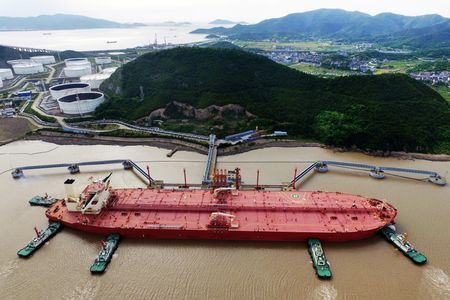By Jeslyn Lerh and Trixie Yap
SINGAPORE (Reuters) – Indonesia’s Karimun terminal has ramped up imports of Russian oil products to become a key transshipment hub where traders store cargoes whose countries of origin are rebranded before re-export, according to eight industry sources and ship-tracking data.
Russian oil exports have shifted to Asia from Europe in the aftermath of Moscow’s 2022 invasion of Ukraine as Western sanctions aimed at limiting Moscow’s oil revenue make direct imports from Russia difficult for many buyers.
A system of traders, shippers and transshipment points, including the floating hub along the Malacca and Singapore Straits and Fujairah in the United Arab Emirates, have helped keep Russian oil and products flowing, despite the sanctions.
Since October, the terminal, located in a free trade zone on an island about 37 km (23 miles) southwest of Singapore, has received Russian oil products every month, ship-tracking data from Kpler showed, with exports to destinations in Malaysia, Singapore and China.
Before that, the data shows, Russian oil product arrivals at Karimun were only sporadic.
More than 500,000 metric tons (3.2 million barrels) of fuel oil loaded from Russia’s Ust Luga oil terminal has arrived at Karimun so far this year, nearly five times the volume in the corresponding 2024 period, Kpler data showed.
Some 217,000 tons (1.6 million barrels) of Russian diesel have arrived at Karimun this year, versus none last year, while this year’s imports of more than 50,000 tons (450,000 barrels) of Russian naphtha are up slightly from a year earlier.
Karimun exported a record 590,000 tons of oil products in March, Kpler data showed, helping keep Asia well-supplied with refined products, particularly high-sulphur fuel oil, which traded into discounts to Singapore quotes, sources said.
The sources spoke on condition of anonymity as the matter is a sensitive one.
Indonesia’s energy ministry said it did not have information on activities in Karimun because it is a free trade zone and thus beyond its authority.
Officials at Indonesia’s coordinating ministry of economics, which is part of the special economic zone and the free trade zone board, did not respond to requests for comment.
Dubai-based Novus Middle East DMCC, which bought the 720,000 cubic metre PT Oil Terminal Karimun in the second quarter last year from Germany’s Oiltanking, did not respond to a request for comment.
PT Oil Terminal Karimun also did not respond to a request for comment.
SANCTIONED TANKERS
Russia’s share of oil imports at the Karimun terminal jumped to more than 60% from October and were as high as 100% in April, Kpler data showed, up from between zero and 26% a month in the first half of 2024.
At least three cargoes arrived at Karimun in March and April on tankers sanctioned by the European Union or Britain, Kpler data showed.
Some of these cargoes are blended before getting re-exported, three of the sources said.
The cargoes are traded through intermediaries, often obscure trading firms that frequently change their names, before heading to their final destinations, the eight sources said.
Tan Albayrak, an international trade lawyer focusing on economic sanctions and export controls at Reed Smith LLP, said that while a storage facility could be exposed to sanctions by receiving cargoes from a sanctioned vessel, blending or refining the products themselves would provide a new country of origin.
“If the received oil product was genuinely transformed into another oil product, then it will be considered Indonesian origin such that the Russia sanctions will no longer attach to product,” Albayrak said.
“At that point, there would not be an exposure to players down the chain, such as traders or buyers,” he added.
(Reporting by Jeslyn Lerh and Trixie Yap in Singapore; Additional reporting by Michele Pek in Singapore, Bernadette Christina in Jakarta and Reuters reporters in Moscow; Editing by Florence Tan, Tony Munroe and Clarence Fernandez)









